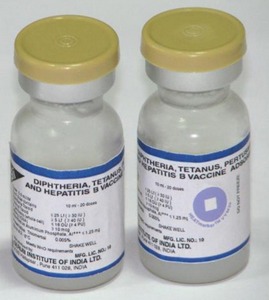The vaccine against diphtheria – DPT vaccination against diphtheria – Tdap vaccination against diphtheria – DTaP vaccine
What is diphtheria?
Diphtheria – a highly contagious and potentially life-threatening infection. It is caused by a bacterium called Corynebacterium diphtheriae. Germ proizvodit toxin, which could spread from the site of infection to other tissues in the body. Diphtheria usually affects the throat and nose. In severe cases it can affect the nervous system and the heart.
Diphtheria spreads easily from person to person through coughing or sneezing. In rare cases, transmission occurs by direct contact with secretions from the mouth, nose, throat and skin of an infected person.
What is the vaccine against diphtheria?
Difteriйnaя vaccine soderzhit inaktivirovannoй toxin, called toxoid. There are different types of vaccines for the prevention of diphtheria, including:
- DPT – introduces children to protect against diphtheria, tetanus and pertussis;
- DT – introduces children, which can not be administered vaccine against pertussis, as part of the DPT vaccine;
- Tdap – introduces children, adolescents and adults to protect against tetanus, diphtheria and whooping cough;
- Td – introduced adolescents and adults to protect against tetanus and diphtheria.
Vaccination is the muscle.

Who and when to be vaccinated?
DPT
Vakцinaцija DPT, usually, is required before starting school. Routine immunization is carried out in the following terms:
- 2 of the month;
- 4 of the month;
- 6 months;
- 15-18 months;
- 4-6 years.
Tdap
Tdap is usually recommended for children 11-12 years, who were vaccinated with DTP. Tdap may also receive the following categories:
- Children 7-10 years, which have not been fully vaccinated;
- Children and teenagers 13-18 years, who have not received Tdap in 11-12 years;
- Adults under the age of 65 years, who have never received Tdap;
- Pregnant women after 20 weeks of pregnancy, who have not previously received Tdap;
- Adult, who have not previously been vaccinated and which come into contact with children aged 12 months and younger;
- Medical profession, who have not previously received Tdap.
Td
Repeated immunization with Td vaccine is held every 10 years.
Schedule of vaccinations
If you or your child has not been fully vaccinated against diphtheria, talk to your doctor.
Risks, associated with diphtheria vaccine
Most people tolerate the vaccine without any problems. The most common side effects are:
- Soft side effects: soreness and redness at the injection site, slight fever, fatigue, general irritability, anorexia, vomiting;
- More serious complications:
- Rarely: allergic reactions, crying for more than three hours, heat;
- Rarely: convulsions, associated with brain damage.
Sometimes given paracetamol, to reduce pain and fever, which may occur after vaccination. In children, the medication may weaken the effectiveness of the vaccine. It should discuss the risks and benefits, associated with the use of drugs with a doctor.
Who should not be vaccinated against diphtheria?
There are two circumstances, in which vaccination risks outweigh its benefits:
- Severe allergic reactions (anaphylactic shock);
- Severe brain disorders (encephalitis), occur within seven days.
Because the vaccine against diphtheria, usually, is part of DTP, It is sometimes difficult to determine, which component is causing the problem. Usually, better, avoid all three vaccines, If there are serious side effects.
If your child has any of the following reactions occurred, You should immediately seek medical assistance:
- Temperature above 40,5 ° C;
- Severe swelling of the entire limb, used for vaccination;
- Shock reaction – together with low blood pressure;
- Resistant, incessant crying for more than three hours;
- Cramps with or without fever – within three days.
If your child is sick – moderate to severe form of the disease, do not vaccinate, until he has recovered.
What are the ways to prevent diphtheria in addition to vaccination?
Prevention of diphtheria vaccination depends on the speed of the response to the outbreak.
What happens in case of an outbreak of diphtheria?
Suspected cases of diphtheria have to report immediately to the health authorities.
In the case of suspected or confirmed outbreaks only close contacts, believed, lead to the risk of infection. For individuals, close contacts with the patients of diphtheria treatment includes:
- Instant vaccination, If it was less than three inoculations;
- Revakcinaciâ, If there was no vaccination in the past five years;
- The selection of samples for laboratory analysis, antibiotics;
- Surveillance of suspects for seven days (even if vaccinated).
